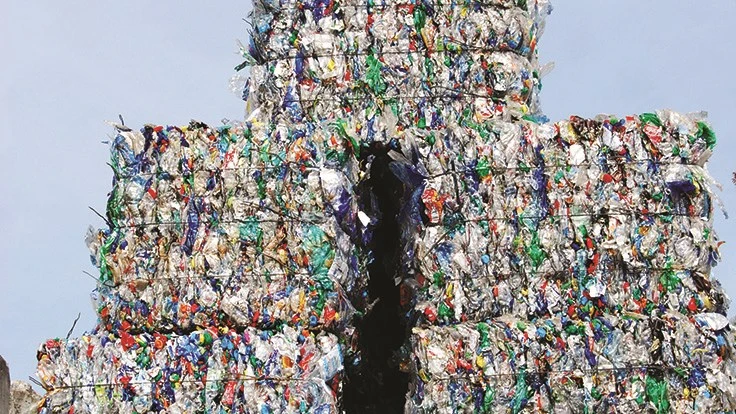
The European Union has adopted a new policy agenda with the goal that all plastic packaging in the EU market will be recyclable or reusable by 2030. Further, the agenda targets single-use plastics, with the goal of reducing or eliminating them. The strategy, the commission says, is part of the transition toward a more circular economy.
The policy, which requires plastic packaging on the EU market to be recyclable by 2030 and reduces consumption of single-use plastics and restricts the intentional use of microplastics, is designed to protect the environment from plastic pollution and to foster growth and innovation. “There is a strong business case for transforming the way products are designed, produced, used and recycled in the EU, and by taking the lead in this transition, we will create new investment opportunities and jobs,” the commission says in a news release announcing the policy.
Commission First Vice President Frans Timmermans, responsible for sustainable development, says in a news releaes about the adoption of the policy agenda, "If we don't change the way we produce and use plastics, there will be more plastics than fish in our oceans by 2050. We must stop plastics getting into our water, our food, and even our bodies. The only long-term solution is to reduce plastic waste by recycling and reusing more. This is a challenge that citizens, industry and governments must tackle together. With the EU Plastics Strategy we are also driving a new and more circular business model. We need to invest in innovative new technologies that keep our citizens and our environment safe whilst keeping our industry competitive."
Commission Vice President Jyrki Katainen, responsible for jobs, growth, investment and competitiveness, adds, "With our plastic strategy we are laying the foundations for a new circular plastics economy and driving investment towards it. This will help to reduce plastic litter in land, air and sea while also bringing new opportunities for innovation, competitiveness and high-quality jobs. This is a great opportunity for European industry to develop global leadership in new technology and materials. Consumers are empowered to make conscious choices in favor of the environment. This is true win-win."
Europeans generate 25 million metric tons of plastic waste annually, but less than 30 percent of this material is collected for recycling. Across the world, plastics make up 85 percent of beach litter, the commission says.
Too often the ways plastics are produced, used and discarded fail to capture the economic benefits of a more circular approach, the commission says. “The goal is to protect the environment whilst at the same time lay foundations to a new plastic economy, where the design and production fully respect reuse, repair and recycling needs and more sustainable materials are developed,” the commission states in its press release.
With the plastic strategy, the commission has adopted a monitoring framework composed of a set of 10 key indicators that cover each phase of the cycle, which will measure progress towards the transition to a circular economy at EU and national level.
Under the new strategy, the commission says the European Union will:
- make recycling profitable for business – New rules on packaging will be developed to improve the recyclability of plastics used on the market and increase the demand for recycled plastic content. With more plastic being collected, improved and scaled up, recycling facilities should be set up, alongside a better and standardized system for the separate collection and sorting of material across the EU. This will save around a hundred euros per metric ton collected. It will also deliver greater added value for a more competitive, resilient plastics industry.
- curb plastic waste – European legislation has already led to a significant reduction in plastic bag use in several member states. The new plans will now turn to other single-use plastics and fishing gear, supporting national awareness campaigns and determining the scope of new EU-wide rules to be proposed in 2018 based on stakeholder consultation and evidence. The Commission will also take measures to restrict the use of microplastics in products and fix labels for biodegradable and compostable plastics.
- stop littering at sea – New rules on port reception facilities will tackle sea-based marine litter, with measures to ensure that waste generated on ships or gathered at sea is not left behind but returned to land and adequately managed there. Also included are measures to reduce the administrative burden on ports, ships and competent authorities.
- drive investment and innovation – The Commission will provide guidance for national authorities and European businesses on how to minimize plastic waste at source. Support for innovation will be scaled up, with an additional €100 million financing the development of smarter and more recyclable plastics materials, making recycling processes more efficient, and tracing and removing hazardous substances and contaminants from recycled plastics.
- spur change across the world – As the European Union does its own homework, we will also work with partners from around the world to come up with global solutions and develop international standards. We will also continue to support others, as we have done with the clean-up of the Ganga River in India.
The directive on port reception facilities has gone to the European Parliament and Council for adoption.
Subject to Better Regulation requirements, the commission will present the proposal on single-use plastics later in 2018.
The commission says it will launch the work on the revision of the Packaging and Packaging Waste Directive and prepare guidelines on separate collection and sorting of waste to be issued in 2019.
Latest from Recycling Today
- Nucor receives West Virginia funding assist
- Ferrous market ends 2024 in familiar rut
- Aqua Metals secures $1.5M loan, reports operational strides
- AF&PA urges veto of NY bill
- Aluminum Association includes recycling among 2025 policy priorities
- AISI applauds waterways spending bill
- Lux Research questions hydrogen’s transportation role
- Sonoco selling thermoformed, flexible packaging business to Toppan for $1.8B





